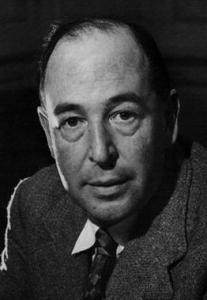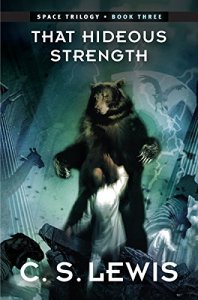By Michael Grossberg

Works by James Blish, Philip K. Dick, Aldous Huxley, C.S. Lewis, Frederik Pohl, Adam Roberts, J. Michael Straczynski, Charles Stross and Harry Turtledove have been nominated for the next Prometheus Hall of Fame Award for Best Classic Fiction.

A majority of this year’s Hall of Fame nominees are appearing on the short list for the first time – a promising sign that this category for time-honored classic fiction remains full of notable and lasting works worth recognizing.

The oldest nominee on the list is Aldous Huxley’s 1932 novel Brave New World, with the second-oldest C.S. Lewis’ 1945 novel That Hideous Strength.
While Lewis’ cautionary sf novel has been nominated before and previously has ranked as a Best Classic Fiction finalist, Huxley’s dystopian classic has never before been nominated for the Prometheus Award – and is arguably overdue.

 Other nominated works were first published or broadcast in 1961, 1974, 1994, 1998, 2000 and 2003.
Other nominated works were first published or broadcast in 1961, 1974, 1994, 1998, 2000 and 2003.
Unlike the Prometheus Award for Best Novel, which focuses on novels first published during the most-recent calendar year, the Prometheus Hall of Fame is limited to older works that were first published, released, recorded, broadcast or screened at least 20 years ago.
Of this year’s nominees, all but two are novels.
 The exceptions are “The Kindly Isle,” a 1984 story by Frederik Pohl, and Babylon 5, a 1994-1998 TV series created by writer-producer J. Michael Straczynski.
The exceptions are “The Kindly Isle,” a 1984 story by Frederik Pohl, and Babylon 5, a 1994-1998 TV series created by writer-producer J. Michael Straczynski.
 Hall of Fame nominees encompass fantastic fiction (including but not limited to science fiction and fantasy) created in any narrative or dramatic form, including prose fiction, stage plays, film, television, other video, graphic novels, song lyrics, or epic or narrative verse.
Hall of Fame nominees encompass fantastic fiction (including but not limited to science fiction and fantasy) created in any narrative or dramatic form, including prose fiction, stage plays, film, television, other video, graphic novels, song lyrics, or epic or narrative verse.
 Here is the list of 2025 nominees for the next Prometheus Hall of Fame award, which will be presented in 2026:
Here is the list of 2025 nominees for the next Prometheus Hall of Fame award, which will be presented in 2026:
Prometheus Hall of Fame nominees for Best Classic Fiction

* The Star Dwellers, a 1961 novel by James Blish
* Flow My Tears, the Policeman Said, a 1974 novel by Philip K. Dick
* Brave New World, a 1932 novel by Aldous Huxley
* That Hideous Strength, a 1945 novel by C.S. Lewis
 * “The Kindly Isle,” a 1984 story by Frederik Pohl
* “The Kindly Isle,” a 1984 story by Frederik Pohl
* Salt, a 2000 novel by Adam Roberts
* Babylon 5, a 1994-1998 TV series created by writer-director J. Michael Straczynski
 * Singularity Sky, a 2003 novel by Charles Stross
* Singularity Sky, a 2003 novel by Charles Stross
* Between the Rivers, a 1998 novel by Harry Turtledove
 THE FOCUS OF THE PROMETHEUS AWARDS
THE FOCUS OF THE PROMETHEUS AWARDS
First presented in 1979 (for Best Novel) and in 1983 (for the Prometheus Hall of Fame), the Prometheus Awards have recognized outstanding works of science fiction and fantasy that dramatize the perennial conflict between liberty and power, favor private social cooperation over legalized coercion, expose abuses and excesses of obtrusive government, critique or satirize authoritarian ideas, or champion individual rights and freedoms as the mutually respectful foundation for peace, prosperity, progress, justice, tolerance, civility, and civilization itself.
For descriptions of Prometheus Hall of Fame nominees and more information about the eligibility and judging process of the Hall of Fame category for Best Classic Fiction, read this previous Prometheus Blog article posted in August.
ABOUT THE PROMETHEUS AWARDS AND THE LFS
* Join us! To help sustain the Prometheus Awards and support a cultural and literary strategy to appreciate and honor freedom-loving fiction, join the Libertarian Futurist Society, a non-profit all-volunteer international association of freedom-loving sf/fantasy fans.
Libertarian futurists understand that culture matters. We believe that literature and the arts can be vital in envisioning a freer and better future. In some ways, culture can be even more influential and powerful than politics in the long run, by imagining better visions of the future incorporating peace, prosperity, progress, tolerance, justice, positive social change, and mutual respect for each other’s rights, human dignity, individuality and peaceful choices.
* Prometheus winners: For a full list of Prometheus winners, finalists and nominees – including in the annual Best Novel and Best Classic Fiction (Hall of Fame) categories and occasional Special Awards – visit the enhanced Prometheus Awards page on the LFS website. This page includes convenient links to all published essay-reviews in our Appreciation series explaining why each of more than 100 past winners since 1979 fits the awards’ distinctive dual focus on both quality and liberty.
* Watch videos of past Prometheus Awards ceremonies, Libertarian Futurist Society panel discussions with noted sf authors and leading libertarian writers, and other LFS programs on the Prometheus Blog’s Video page.
* Read “The Libertarian History of Science Fiction,” an essay in the international magazine Quillette that favorably highlights the Prometheus Awards, the Libertarian Futurist Society and the significant element of libertarian sf/fantasy in the evolution of the modern genre.
- Check out the Libertarian Futurist Society’s Facebook page for comments, updates and links to the latest Prometheus Blog posts.
